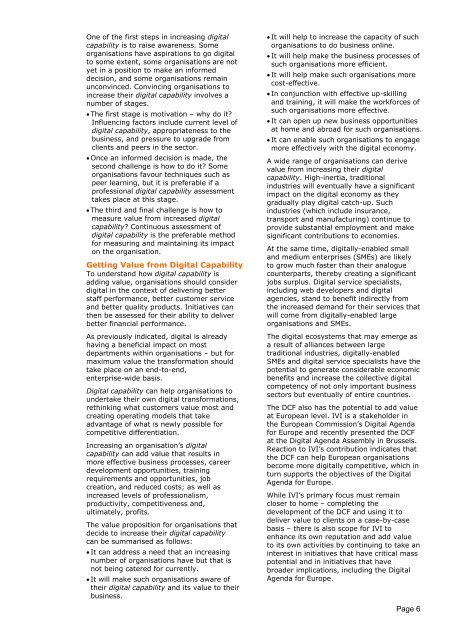Digital Capability - IVI Innovation Value Institute - National University ...
Digital Capability - IVI Innovation Value Institute - National University ...
Digital Capability - IVI Innovation Value Institute - National University ...
Create successful ePaper yourself
Turn your PDF publications into a flip-book with our unique Google optimized e-Paper software.
One of the first steps in increasing digital<br />
capability is to raise awareness. Some<br />
organisations have aspirations to go digital<br />
to some extent, some organisations are not<br />
yet in a position to make an informed<br />
decision, and some organisations remain<br />
unconvinced. Convincing organisations to<br />
increase their digital capability involves a<br />
number of stages.<br />
• The first stage is motivation – why do it?<br />
Influencing factors include current level of<br />
digital capability, appropriateness to the<br />
business, and pressure to upgrade from<br />
clients and peers in the sector.<br />
• Once an informed decision is made, the<br />
second challenge is how to do it? Some<br />
organisations favour techniques such as<br />
peer learning, but it is preferable if a<br />
professional digital capability assessment<br />
takes place at this stage.<br />
• The third and final challenge is how to<br />
measure value from increased digital<br />
capability? Continuous assessment of<br />
digital capability is the preferable method<br />
for measuring and maintaining its impact<br />
on the organisation.<br />
Getting <strong>Value</strong> from <strong>Digital</strong> <strong>Capability</strong><br />
To understand how digital capability is<br />
adding value, organisations should consider<br />
digital in the context of delivering better<br />
staff performance, better customer service<br />
and better quality products. Initiatives can<br />
then be assessed for their ability to deliver<br />
better financial performance.<br />
As previously indicated, digital is already<br />
having a beneficial impact on most<br />
departments within organisations – but for<br />
maximum value the transformation should<br />
take place on an end-to-end,<br />
enterprise-wide basis.<br />
<strong>Digital</strong> capability can help organisations to<br />
undertake their own digital transformations,<br />
rethinking what customers value most and<br />
creating operating models that take<br />
advantage of what is newly possible for<br />
competitive differentiation.<br />
Increasing an organisation’s digital<br />
capability can add value that results in<br />
more effective business processes, career<br />
development opportunities, training<br />
requirements and opportunities, job<br />
creation, and reduced costs; as well as<br />
increased levels of professionalism,<br />
productivity, competitiveness and,<br />
ultimately, profits.<br />
The value proposition for organisations that<br />
decide to increase their digital capability<br />
can be summarised as follows:<br />
• It can address a need that an increasing<br />
number of organisations have but that is<br />
not being catered for currently.<br />
• It will make such organisations aware of<br />
their digital capability and its value to their<br />
business.<br />
• It will help to increase the capacity of such<br />
organisations to do business online.<br />
• It will help make the business processes of<br />
such organisations more efficient.<br />
• It will help make such organisations more<br />
cost-effective.<br />
• In conjunction with effective up-skilling<br />
and training, it will make the workforces of<br />
such organisations more effective.<br />
• It can open up new business opportunities<br />
at home and abroad for such organisations.<br />
• It can enable such organisations to engage<br />
more effectively with the digital economy.<br />
A wide range of organisations can derive<br />
value from increasing their digital<br />
capability. High-inertia, traditional<br />
industries will eventually have a significant<br />
impact on the digital economy as they<br />
gradually play digital catch-up. Such<br />
industries (which include insurance,<br />
transport and manufacturing) continue to<br />
provide substantial employment and make<br />
significant contributions to economies.<br />
At the same time, digitally-enabled small<br />
and medium enterprises (SMEs) are likely<br />
to grow much faster than their analogue<br />
counterparts, thereby creating a significant<br />
jobs surplus. <strong>Digital</strong> service specialists,<br />
including web developers and digital<br />
agencies, stand to benefit indirectly from<br />
the increased demand for their services that<br />
will come from digitally-enabled large<br />
organisations and SMEs.<br />
The digital ecosystems that may emerge as<br />
a result of alliances between large<br />
traditional industries, digitally-enabled<br />
SMEs and digital service specialists have the<br />
potential to generate considerable economic<br />
benefits and increase the collective digital<br />
competency of not only important business<br />
sectors but eventually of entire countries.<br />
The DCF also has the potential to add value<br />
at European level. <strong>IVI</strong> is a stakeholder in<br />
the European Commission’s <strong>Digital</strong> Agenda<br />
for Europe and recently presented the DCF<br />
at the <strong>Digital</strong> Agenda Assembly in Brussels.<br />
Reaction to <strong>IVI</strong>’s contribution indicates that<br />
the DCF can help European organisations<br />
become more digitally competitive, which in<br />
turn supports the objectives of the <strong>Digital</strong><br />
Agenda for Europe.<br />
While <strong>IVI</strong>’s primary focus must remain<br />
closer to home – completing the<br />
development of the DCF and using it to<br />
deliver value to clients on a case-by-case<br />
basis – there is also scope for <strong>IVI</strong> to<br />
enhance its own reputation and add value<br />
to its own activities by continuing to take an<br />
interest in initiatives that have critical mass<br />
potential and in initiatives that have<br />
broader implications, including the <strong>Digital</strong><br />
Agenda for Europe.<br />
Page 6












